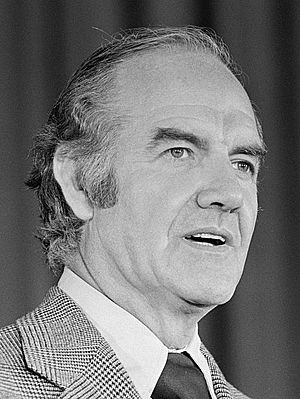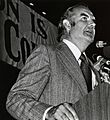George McGovern facts for kids
Quick facts for kids
George McGovern
|
|
|---|---|

McGovern in 1972
|
|
| United States Senator from South Dakota |
|
| In office January 3, 1963 – January 3, 1981 |
|
| Preceded by | Joseph H. Bottum |
| Succeeded by | James Abdnor |
| United States Ambassador to the United Nations Agencies for Food and Agriculture | |
| In office March 10, 1998 – September 28, 2001 |
|
| President | |
| Preceded by | Thomas A. Forbord |
| Succeeded by | Tony P. Hall |
| Chair of the United States Senate Select Committee on Nutrition and Human Needs | |
| In office July 1968 – December 1977 |
|
| Preceded by | Committee established |
| Succeeded by | Committee abolished |
| Director of Food for Peace | |
| In office January 21, 1961 – July 18, 1962 |
|
| President | John F. Kennedy |
| Preceded by | Position established |
| Succeeded by | Richard W. Reuter |
| Member of the U.S. House of Representatives from South Dakota's 1st district |
|
| In office January 3, 1957 – January 3, 1961 |
|
| Preceded by | Harold Lovre |
| Succeeded by | Ben Reifel |
| Personal details | |
| Born |
George Stanley McGovern
July 19, 1922 Avon, South Dakota, U.S. |
| Died | October 21, 2012 (aged 90) Sioux Falls, South Dakota, U.S. |
| Resting place | Rock Creek Cemetery |
| Political party | Democratic |
| Other political affiliations |
Progressive (1948) |
| Spouse |
Eleanor Stegeberg
(m. 1943; died 2007) |
| Children | 6 |
| Education | Dakota Wesleyan University (BA) Garrett Theological Seminary
Northwestern University (MA, PhD) |
| Signature | |
| Military service | |
| Branch/service | |
| Years of service | 1943–1945 |
| Rank | |
| Unit |
|
| Battles/wars |
|
| Awards |
|
George Stanley McGovern (July 19, 1922 – October 21, 2012) was an American historian and politician from South Dakota. He served as a U.S. representative and later as a U.S. senator for three terms. He was also the Democratic Party candidate for president in the 1972 election.
Contents
Early Life and Education
George McGovern was born in a small farming town called Avon, South Dakota. His father was a pastor, and his mother worked as a secretary. George was one of four children. His family often struggled financially, which made him care deeply about helping workers and farmers.
When George was six, his family moved to Mitchell, South Dakota. He went to public schools there. As a child, he was very shy and found it hard to speak in class. He loved visiting the famous Corn Palace in Mitchell. He also remembered the tough times of the Dust Bowl and grasshopper plagues during the Great Depression. These events shaped his desire to fight poverty and injustice.
High School and Debate
At Mitchell High School, George joined the debate team. This changed his life! Debating helped him explore ideas and become more confident. He and his debate partner became well-known in the state. He graduated in 1940, ranking among the top students in his class.
College and Flying Lessons
McGovern attended Dakota Wesleyan University in Mitchell. He was a great student and worked many jobs to pay for college. With World War II happening, he felt he needed to be brave. He took flying lessons and earned a pilot's license. He later said that landing his first solo flight gave him a huge feeling of success.
On December 7, 1941, he heard about the attack on Pearl Harbor on the radio. Soon after, he volunteered for the United States Army Air Forces. He continued his studies until the Army called him up. In 1943, he won a major debate tournament.
Military Service and Public Career
George McGovern joined the U.S. Army Air Forces during World War II. He became a pilot of a B-24 Liberator bomber. He flew 35 dangerous missions over German-occupied Europe from a base in Italy. He earned the Distinguished Flying Cross for safely landing his damaged plane and saving his crew.
After the war, he finished his degrees, including a PhD, and became a history professor.
Entering Politics
McGovern was elected to the U.S. House of Representatives in 1956. He was re-elected in 1958. After trying for the U.S. Senate in 1960 and not winning, he succeeded in 1962.
As a senator, McGovern was known for his liberal views. He strongly spoke out against the growing U.S. involvement in the Vietnam War. He even ran briefly for president in 1968 after Robert F. Kennedy was assassinated.
Changing the Election Process
McGovern led a group called the McGovern–Fraser Commission. This group made big changes to how presidential candidates are chosen. They increased the number of caucuses and primaries. This gave more power to regular voters and less to party leaders.
1972 Presidential Campaign
In 1972, McGovern ran for president. He won the Democratic nomination, but his campaign faced challenges. He lost the election to Richard Nixon in one of the biggest landslides in U.S. history. Even though he lost the presidency, he was re-elected to the Senate in 1968 and 1974. He lost his bid for a fourth term in 1980.
Fighting Hunger and Helping Others
McGovern cared deeply about food, nutrition, and hunger. This passion started with his experiences in war-torn Italy.
Food for Peace Program
In 1961, he became the first director of the Food for Peace program. He helped send extra U.S. food to people in need around the world. He also helped create the World Food Programme, which is run by the United Nations.
Nutrition Guidelines
From 1968 to 1977, McGovern led the Senate Select Committee on Nutrition and Human Needs. He brought attention to hunger in the U.S. and released the "McGovern Report." This report led to new guidelines for what Americans should eat to stay healthy.
Global Ambassador for Hunger
Later in his career, he continued his work. From 1998 to 2001, he was the U.S. ambassador to the United Nations Agencies for Food and Agriculture. In 2001, he became the first UN global ambassador on world hunger.
The McGovern–Dole International Food for Education and Child Nutrition Program has provided school meals to millions of children worldwide since 2000. For his work, McGovern received the World Food Prize in 2008.
Later Years and Legacy
George McGovern passed away on October 21, 2012, at the age of 90. He was surrounded by his family and friends. His family said he lived a long, productive life. They remembered him for advocating for the hungry, being a voice for progress, and fighting for peace.
President Obama called McGovern "a champion for peace" and a "statesman of great conscience." Vice President Joe Biden praised his service in World War II and his opposition to the Vietnam War. He said McGovern was a "genuine hero."
McGovern's Impact
Even after his big loss in the 1972 election, McGovern remained an important figure. He stood for liberal ideas, especially during the challenging times of the 1960s and 1970s. These were years when the country was divided by the Vietnam War and issues with the Nixon administration.
His work on the McGovern–Fraser Commission changed how both the Democratic and Republican parties choose their presidential candidates. These changes are still in place today.
McGovern's reputation grew stronger after he left politics. Many people, like author Tom Brokaw, called him part of the "Greatest Generation." He was seen as one of the country's most decent and thoughtful public servants.
His biggest legacy is his dedication to ending hunger. He once said, "After I'm gone, I want people to say about me: He did the best he could to end hunger in this country and the world." Many believe he helped more people in need than many presidents or secretaries of state.
Awards and Decorations
McGovern received several honors for his service:
 |
||
| Army Air Forces Pilot Badge | ||
| Distinguished Flying Cross | Air Medal with 3 bronze oak leaf clusters |
Presidential Medal of Freedom |
| American Campaign Medal | European–African–Middle Eastern Campaign Medal with 4 bronze campaign stars |
World War II Victory Medal |
See also
 In Spanish: George McGovern para niños
In Spanish: George McGovern para niños
- List of awards and honors received by George McGovern
- Electoral history of George McGovern
- George McGovern in popular culture
- List of peace activists
- Jim McGovern (American politician)
Images for kids
-
The Corn Palace, a famous sight in McGovern's hometown of Mitchell.
-
The effects of a 1936 Dust Bowl storm in nearby Gregory County, South Dakota.
-
McGovern speaking at the Richard Nixon Presidential Library and Museum in 2009.
-
Nose art on a B-1 Lancer in 2007, honoring McGovern's service as a B-24 pilot.
-
Senator McGovern on his first trip to South Vietnam, November 1965.
-
Senator McGovern visiting an American photography exhibition in Tbilisi in the Soviet Union in 1977.
 | Isaac Myers |
 | D. Hamilton Jackson |
 | A. Philip Randolph |




















